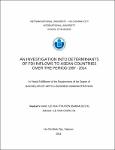| dc.description.abstract | Foreign direct investment (FDI) has become an important and irreplaceable factor in promoting economic growth, exporting activity and social development of host countries. As a result, the competition for FDI attraction, especially among developing nations, has been getting intense through years. In order to help Vietnam improve its competitiveness against other ASEAN member states in the progress of AEC establishment as well as have better preparation to take full advantage of investment opportunities from successfully joining TPP bloc, this study has been conducted and primarily aimed at examining the drivers of inward FDI to 10 ASEAN countries over the period 1997 – 2014. By applying panel data analysis and subsequently random effects model towards the research model specified according to Hussain and Kimuli (2012) and Hoang (2012), the empirical results showed that market size, labor availability, labor quality and ease of doing business play important role in attracting FDI inflows to ASEAN countries during this period. By contrast, economic instability and cost of obtaining capital in host countries could deteriorate their attractiveness in the eyes of foreign investors. Especially, openness to international trade was found to have adverse impact on inward FDI to ASEAN during this period. The reason for this issue is believed to lie in the nature of market – seeking motives implied behind the locational investment decision of foreign enterprises although there is indeed no sufficient evidence to prove its dominance unambiguous in this study.
Based on these findings, some conclusive implications was made to help Vietnam understand the implicit expectations of foreign investors when choosing to invest in ASEAN during this period, thence quickly determine the strategies and take practical actions to not only improve its competitiveness but also have better preparation in the coming race for FDI attraction. To assist the government in accomplishing this mission, some policy recommendations were provided at the end of this study. | en_US |


